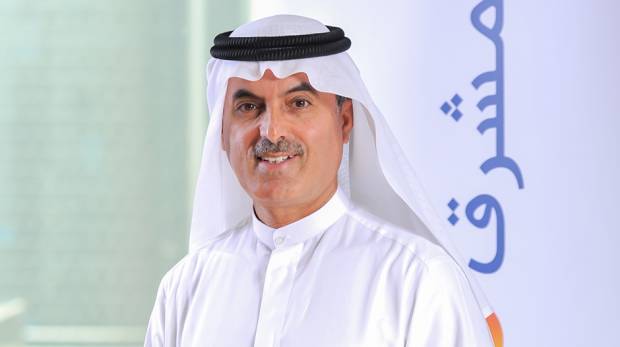Banking on the future

Abdul Aziz Al Ghurair, CEO of Mashreq Bank, on what to expect in the financial sector over the next decade
What will be the future of banking? Will the financial sector be able to withstand the onslaught of fintechs? Is this the end of branch banking as we know it? There are few better places in Dubai to contemplate such questions than Abdul Aziz Al Ghurair’s inconspicuous teak-panelled 6th floor office at Mashreq Bank’s headquarters in Deira. Al Ghurair and his family have been at the heart of the financial and economic transformation of the Emirates for several decades.
He helped found Mashreq in 1967. He is also chairman of the UAE Banks Federation, the trade association that speaks on behalf of the industry, to governments and federal bodies like the Central Bank. Through his family business, he is also plugged into the country’s broader economic sectors of real estate, construction and retail.
Click to see Mashreq’s trailblazing role in the UAE over the past five decades (PDF)
Appointed to the role of CEO in 1990, Al Ghurair has steered Mashreq into a world-class financial services institution. In Al Ghurair’s 28 years as CEO, Mashreq has delivered a higher total return than every major bank in the UAE. As the bank’s hands-on chief executive, assets have risen to Dh127 billion as of July 2018, from Dh1 billion in 1976, the year Mashreq moved into its current head office in Deira. In this interview, Al Ghurair looks to the future — one in which he foresees a whole different landscape for the banking sector:
With technology fast evolving, customers are living in a connected world, how do you envision the future of banking?
The global banking industry is going through a period of rapid transformation, heralded by disruption and driven by emerging digital technologies. The unbelievable pace of change in technological advancements is making possible what was not feasible earlier.
A recent survey carried out by Accenture Research found that 77 per cent of leading banking institutions will deploy artificial intelligence (AI) to automate tasks over the next three years.
Today, most banks in the UAE already use AI as a primary method to interact with customers. It’s not just customer service that is being revolutionised thanks to AI — the technology also offers valuable applications in cybersecurity, fraud prevention and anti-money laundering.
I believe AI is a huge game-changer as there is increasing evidence to show the ability of machines to learn and adapt to their environments.
Banking customers in the UAE are already interacting with AI-powered services on daily basis. These range from chat-bots, virtual personal assistants to bilingual humanoid robots, which are being rolled out with the goal of streamlining customer service processes and meeting the evolving needs of today’s tech-savvy consumers.

What challenges do you see for fintechs especially with the hype around them?
Much of the conversation around fintech has been on areas where banks were traditionally weak: that they’re slow to adopt new technology; they don’t focus on the customer; they’re too big to respond to change. But this is quickly changing. Banks are utilising technology today to stay ahead of the curve.
There’s a lot of areas that banks do right — that fintech startups can struggle to replicate. For example, banks have large customer bases, capital, resources, and deep expertise in managing risk, like liquidity risk, market risk or credit risk.
Banks also have something that fintechs don’t possess — enormous stores of in-house data, including consumer demographics, transaction and product usage, credit behaviour history and customers.
Having said that I feel in the next phase, fintechs and banks will work closely in the future to reduce pain points and bring better customer experience.
What about the FANGs? Do you think banks are vulnerable?
The FANGs (Facebook, Amazon, Netflix, and Google) and other tech firms have redefined traditional business models, forcing traditional companies to rethink their operations. They are not fintechs, but they have the disruptive capacity. They have the scale in capital, data and customers.
I think in the financial sector, we keep looking at our competition, and in this regard we primarily look at banks. I think overtime, I am afraid banks will not be competing with banks anymore. There will be new competitors coming in and we have to prepare for that day.
Today customers are willing to switch loyalties to enjoy a superior experience. Size is not the only factor to determine the winner – speed, agility and superior customer experience can make even a smaller player the biggest winner in the race.
Banks are stepping up their game and are looking at innovations not just within the banking industry, but across other industries also. Today, digital transformation, robotics and artificial intelligence have given us important tools to deliver better banking services to our customers.
Around 97 per cent of Mashreq’s retail transactions are taking place outside the branch. Many services have been automated, which has led to an increase in the offer and value banks give to customers.
 Banks in the region initially shrugged off challenges so far, citing long-term customer loyalty to their brands — do you think that is enough?
Banks in the region initially shrugged off challenges so far, citing long-term customer loyalty to their brands — do you think that is enough?
Banks cannot afford to be complacent as the fate of any banking institution largely depends on the quality of personalised customer experience it provides. There is a shift from banks looking to win the ‘battle of the balance sheet’, towards a focus on the ‘battle of the customer’.
Mashreq has always placed its customers first and personalisation is very much what Mashreq is focused on right now. The technology available today can help to better understand individual customers so there is now the ability for banks to make their relationships with customers very personal and meaningful, and offer products that can be relevant based on where the customer is and what they are doing.
I think customer personalisation will be the biggest single area of differentiation that you will see in the market over time.
How can banks deliver personalised banking services for its customers?
To deliver a true personalisation, banks need to have end-to-end digital transformation. Customers want to bank seamlessly from whenever and wherever they want, regardless of the platform they use, their location, or what time of day it is.
Many banks are held back by their own legacy systems. At Mashreq, we have embraced a more holistic approach to digital transformation, which means we are deeply engaged in the transformation to become a digital banking leader.
Every time a customer interacts with a bank through any channel, there is an opportunity to capture customer preferences, behaviours and decisions. All of these touch points generate data. Technological investments in big data and advanced analytics are helping us to transform the data we have into actionable insight for more personalised engagement.
The overall approach should move from thinking of mass customer segments to thinking of ‘a segment of one’.
In the banking sector, where the only constant is change, there’s one skill that you will need to get an edge in the coming decade. What is it?
The ability of people to be successful in the future job market is going to come down to the ability to absorb tremendous amounts of information. There is no doubt that AI has remarkable potential to reinvent the banking industry and employees’ roles within it.
Successful organisations should be focusing on how advances in technology can help their existing team members to work smarter, faster and better — empowering them to increase efficiency and boost productivity.
While automation may reduce the need for certain types of roles in the future, the application of new technologies is poised to generate many fresh job openings across a whole range of industries. Technology does not play an independent role in the overall progress, however, it needs to be integrated with the business and be part of its core competences.
Do you foresee branchless banking growing in popularity?
Branches will continue to play an important role, albeit a different one. Ten years back, an average customer would visit the branch almost 15 times a year. Now the number has become significantly lesser.
Having said that, it is not the death knell for branches as we know them. The good thing is that technology has helped us to transform the branch banking experience. Despite the allure of digital, physical channels – branches and ATMs – will continue to play major roles in banking.
We are not rushing to downsize branch network while financial transactions migrate online as we believe clients will continue to value human interaction especially for advice and consultation.
As an industry veteran, I have seen many trends come and go, but one constant has remained: the human touch, which will continue to be as relevant and necessary where key decision-making is concerned.


